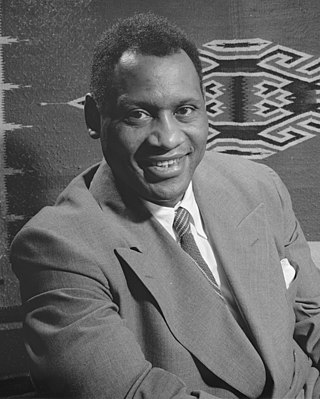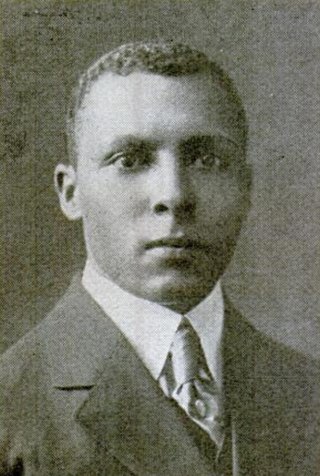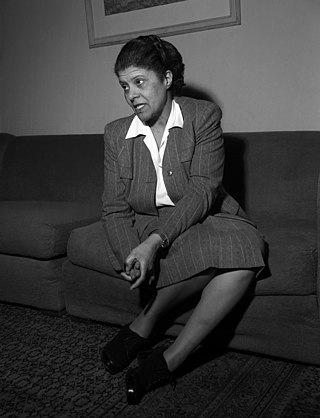Related Research Articles

Paul Leroy Robeson was an American bass-baritone concert artist, stage and film actor, professional football player, and activist who became famous both for his cultural accomplishments and for his political stances.

The Organisation of African Unity was an intergovernmental organization established on 25 May 1963 in Addis Ababa, Ethiopia, with 32 signatory governments. One of the main heads for OAU's establishment was Kwame Nkrumah of Ghana. It was disbanded on 9 July 2002 by its last chairman, South African President Thabo Mbeki, and replaced by the African Union (AU). Some of the key aims of the OAU were to encourage political and economic integration among member states, and to eradicate colonialism and neo-colonialism from the African continent.
The Peekskill riots took place at Cortlandt Manor, New York in 1949. The catalyst for the rioting was an announced concert by black singer Paul Robeson, who was well known for his strong pro-trade union stance, civil rights activism, communist affiliations, and anti-colonialism. The concert, organized as a benefit for the Civil Rights Congress, was scheduled to take place on August 27 in Lakeland Acres, just north of Peekskill.

The Suppression of Communism Act, 1950, renamed the Internal Security Act in 1976, was legislation of the national government in apartheid South Africa which formally banned the Communist Party of South Africa and proscribed any party or group subscribing to communism, according to a uniquely broad definition of the term. It was also used as the basis to place individuals under banning orders, and its practical effect was to isolate and silence voices of dissent.

Pan-Africanism is a worldwide movement that aims to encourage and strengthen bonds of solidarity between all indigenous and diasporas of African ancestry. Based on a common goal dating back to the Atlantic slave trade, the movement extends beyond continental Africans with a substantial support base among the African diaspora in the Americas and Europe.

Roy Ottoway Wilkins was a prominent activist in the Civil Rights Movement in the United States from the 1930s to the 1970s. Wilkins' most notable role was his leadership of the National Association for the Advancement of Colored People (NAACP), in which he held the title of Executive Secretary from 1955 to 1963 and Executive Director from 1964 to 1977. Wilkins was a central figure in many notable marches of the civil rights movement. He made valuable contributions in the world of African-American literature, and his voice was used to further the efforts in the fight for equality. Wilkins' pursuit of social justice also touched the lives of veterans and active service members, through his awards and recognition of exemplary military personnel.
The American Crusade Against Lynching (ACAL) was an organization created in 1946 and headed by Paul Robeson, dedicated to eliminating lynching in the United States. A strong advocate of the Civil Rights Movement, Robeson believed "a fraternity must be established in which success and achievement are recognized and those deserving receive the respect, honor and dignity due them." In his speech "The New Idealism", delivered as a Rutgers College valedictory address, Robeson supported the idea that all – both colored and white people – need to take part in the creation of the new "American Idealism"; which led to the development of the American Crusade Against Lynching.

Max Yergan was an African-American activist notable for being a Baptist missionary for the YMCA, then a Communist working with Paul Robeson, and finally a staunch anti-Communist who complimented the government of apartheid-era South Africa for that part of their program. He was a mentor of Govan Mbeki, who later achieved distinction in the African National Congress. He served as the second president of the National Negro Congress, a coalition of hundreds of African-American organizations created in 1935 by religious, labor, civic and fraternal leaders to fight racial discrimination, establish relations with black organizations throughout the world, and oppose the deportation of black immigrants. Along with Paul Robeson, he co-founded the International Committee on African Affairs in 1937, later the Council on African Affairs.

Eslanda "Essie" Cardozo Goode Robeson was an American anthropologist, author, actress, and civil rights activist. She was the wife and business manager of performer Paul Robeson.
My Song Goes Forth, is the first documentary about South Africa as apartheid was being imposed. The film features singer, actor and civil rights activist Paul Robeson singing the title song and adding a prologue that asks the viewers to interpret the remainder of the film against the producer's intentions. Alternately entitled "Africa Sings", the initial purpose of the film was as a pro-white supremacy short-subject documentary which serves as an advertisement for the birth of apartheid in South Africa but with a conflicting message in the voice-over. Primarily the documentary has been associated with Robeson and early Anti-Apartheid activism due to his re-editing and rewriting of the films' narration.
Entertainer and activist Paul Robeson's political philosophies and outspoken views about domestic and international Communist countries and movements were the subject of great concern to the western mass media and the United States Government, during the Cold War. His views also caused controversy within the ranks of black organizations and the entertainment industry.
The US congressional testimony by Jackie Robinson, the first African-American Major League Baseball player of the modern era, against the famous entertainer and international civil rights activist Paul Robeson, was an American Cold War incident. Its events were precipitated when, at an international student peace conference held in Paris on April 20, 1949, Robeson allegedly made a speech to the effect that African Americans would not support the United States in a war with the Soviet Union, due to continued second-class citizen status under United States law. This subsequent controversy caused the House Committee on Un-American Activities (HUAC) to investigate Robeson and Robinson, as a famed African-American baseball player, was called on to impugn Robeson.

Enuga Sreenivasulu Reddy, also known as E. S. Reddy, was an Indian-born diplomat at the United Nations who led the anti-apartheid efforts at the UN's Special Committee Against Apartheid and its Centre Against Apartheid. He also served as director of the UN Trust Fund for South Africa and the Educational and Training Programme for Southern Africa. During his time in these roles, he campaigned for economic boycott of the then Government of South Africa, advancing anti-apartheid actions including a combination of economic and social measures. He also lobbied for the release of the imprisoned leader Nelson Mandela.

James Desmond Buckle was a political activist, journalist, trade unionist and Communist born in the British colony of the Gold Coast. Described as "an African communist in Britain", he may have been the first African to join the British Communist Party.

Sojourners for Truth and Justice was a radical civil rights organization led by African American women from 1951 to 1952. It was led by activists such as Louise Thompson Patterson, Shirley Graham Du Bois and Charlotta Bass.

Freedom was a monthly newspaper focused on African-American issues published between 1950–1955. The publication was associated primarily with the internationally renowned singer, actor and then officially disfavored activist Paul Robeson, whose column, with his photograph, ran on most of its front pages. Freedom's motto was: "Where one is enslaved, all are in chains!" The newspaper has been described as "the most visible African American Left cultural institution during the early 1950s." In another characterization, "Freedom paper was basically an attempt by a small group of black activists, most of them Communists, to provide Robeson with a base in Harlem and a means of reaching his public... The paper offered more coverage of the labor movement than nearly any other publication, particularly of the left-led unions that were expelled from the CIO in the late 1940s... [It] encouraged its African American readership to identify its struggles with anti-colonial movements in Africa, Asia, and the Caribbean. Freedom gave extensive publicity to... the struggle against apartheid."

The People's Voice, also known as Voice, was a newspaper based in Harlem, New York City to serve the African American community. Adam Clayton Powell, Jr., a New York politician and pastor, founded the newspaper in 1942. Voice mainly focused on racial issues, local events and investigative news, but it also covered entertainment and sports. Many activists and writers contributed to Voice, including Ann Petry, Fredi Washington, and Marvel Cooke. The paper stopped publication in 1948 partly due to accusations that Voice was circulating Communist propaganda.
The anti-apartheid movement was a worldwide effort to end South Africa's apartheid regime and its oppressive policies of racial segregation. The movement emerged after the National Party government in South Africa won the election of 1948 and enforced a system of racial segregation through legislation. Opposition to the apartheid system came from both within South Africa and the international community, in particular Great Britain and the United States. The anti-apartheid movement consisted of a series of demonstrations, economic divestment, and boycotts against South Africa. In the United States, anti-apartheid efforts were initiated primarily by nongovernmental human rights organizations. On the other hand, state and federal governments were reluctant to support the call for sanctions against South Africa due to increasing cold war demands and profitable economic ties. The rift between public condemnation of apartheid and the U.S government's continued support of the South African government delayed efforts to negotiate a peaceful transfer to majority rule. Eventually, a congressional override of President Reagan's veto resulted in passage of the Comprehensive Anti-Apartheid Act in 1986. However, the extent to which the anti-apartheid movement contributed to the downfall of apartheid in 1994 remains under debate.
Alphaeus Hunton Jr. (1903–1970) was a civil right activist. He was executive director of the Council on African Affairs.
Hortense "Tee" Beveridge (1923-1993) was an American film editor and director. She is an important figure in the post-World War II African-American documentary scene, which was characterized as being progressive and socially conscious.
References
- 1 2 3 4 Duberman, Martin, "The Apex of Fame", Paul Robeson, 1989, pp. 284–285.
- ↑ Johanna Selles, "The Hunton Family: A Narrative of Faith through Generations" (pdf), Religious Education.
- ↑ Anthony, David Henry: Max Yergan: Race Man, Internationalist, Cold Warrior, NYU Press, 2006, p. 212.
- ↑ Nixon, Ron (2016). South Africa's Global Propaganda War. London, U.K.: Pluto Press. p. 8. ISBN 9780745399140. OCLC 959031269.
- ↑ Nixon, Ron (2016). South Africa's Global Propaganda War. London, U.K.: Pluto Press. p. 10. ISBN 9780745399140. OCLC 959031269.
- ↑ Forsberg, Walter (2019). Field, Allyson Nadia; Gordon, Marsha (eds.). "Red Star/Black Star: The Early Career of Film Editor Hortense "Tee" Beveridge, 1948-1968". Screening Race in American Nontheatrical Film. Durham, North Carolina: Duke University Press. pp. 119–121. ISBN 9781478004769.
- ↑ "South Africa Uncensored". Smithsonian National Museum of African American History & Culture. Retrieved 25 October 2020.
- 1 2 Duberman, Martin, "Postwar Politics", Paul Robeson, 1989, pp. 296–297.
- ↑ Robeson, Susan, "The Pinnacle of Fame and Fortune", A Pictorial Biography of Paul Robeson: The Whole World in His Hands, 1981, p. 118.
- ↑ "Max Yergan", South African History Online.